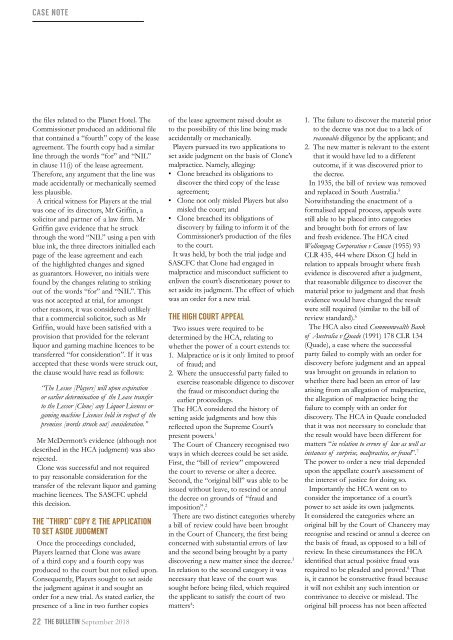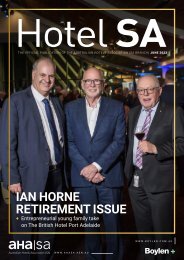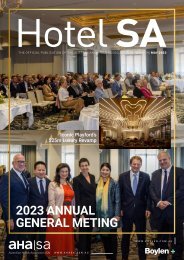LSB September 2018_Web
Create successful ePaper yourself
Turn your PDF publications into a flip-book with our unique Google optimized e-Paper software.
CASE NOTE<br />
the files related to the Planet Hotel. The<br />
Commissioner produced an additional file<br />
that contained a “fourth” copy of the lease<br />
agreement. The fourth copy had a similar<br />
line through the words “for” and “NIL”<br />
in clause 11(i) of the lease agreement.<br />
Therefore, any argument that the line was<br />
made accidentally or mechanically seemed<br />
less plausible.<br />
A critical witness for Players at the trial<br />
was one of its directors, Mr Griffin, a<br />
solicitor and partner of a law firm. Mr<br />
Griffin gave evidence that he struck<br />
through the word “NIL” using a pen with<br />
blue ink, the three directors initialled each<br />
page of the lease agreement and each<br />
of the highlighted changes and signed<br />
as guarantors. However, no initials were<br />
found by the changes relating to striking<br />
out of the words “for” and “NIL”. This<br />
was not accepted at trial, for amongst<br />
other reasons, it was considered unlikely<br />
that a commercial solicitor, such as Mr<br />
Griffin, would have been satisfied with a<br />
provision that provided for the relevant<br />
liquor and gaming machine licences to be<br />
transferred “for consideration”. If it was<br />
accepted that these words were struck out,<br />
the clause would have read as follows:<br />
“The Lessee [Players] will upon expiration<br />
or earlier determination of the Lease transfer<br />
to the Lessor [Clone] any Liquor Licences or<br />
gaming machine Licences held in respect of the<br />
premises [words struck out] consideration.”<br />
Mr McDermott’s evidence (although not<br />
described in the HCA judgment) was also<br />
rejected.<br />
Clone was successful and not required<br />
to pay reasonable consideration for the<br />
transfer of the relevant liquor and gaming<br />
machine licences. The SASCFC upheld<br />
this decision.<br />
THE “THIRD” COPY & THE APPLICATION<br />
TO SET ASIDE JUDGMENT<br />
Once the proceedings concluded,<br />
Players learned that Clone was aware<br />
of a third copy and a fourth copy was<br />
produced to the court but not relied upon.<br />
Consequently, Players sought to set aside<br />
the judgment against it and sought an<br />
order for a new trial. As stated earlier, the<br />
presence of a line in two further copies<br />
22 THE BULLETIN <strong>September</strong> <strong>2018</strong><br />
of the lease agreement raised doubt as<br />
to the possibility of this line being made<br />
accidentally or mechanically.<br />
Players pursued its two applications to<br />
set aside judgment on the basis of Clone’s<br />
malpractice. Namely, alleging:<br />
• Clone breached its obligations to<br />
discover the third copy of the lease<br />
agreement;<br />
• Clone not only misled Players but also<br />
misled the court; and<br />
• Clone breached its obligations of<br />
discovery by failing to inform it of the<br />
Commissioner’s production of the files<br />
to the court.<br />
It was held, by both the trial judge and<br />
SASCFC that Clone had engaged in<br />
malpractice and misconduct sufficient to<br />
enliven the court’s discretionary power to<br />
set aside its judgment. The effect of which<br />
was an order for a new trial.<br />
THE HIGH COURT APPEAL<br />
Two issues were required to be<br />
determined by the HCA, relating to<br />
whether the power of a court extends to:<br />
1. Malpractice or is it only limited to proof<br />
of fraud; and<br />
2. Where the unsuccessful party failed to<br />
exercise reasonable diligence to discover<br />
the fraud or misconduct during the<br />
earlier proceedings.<br />
The HCA considered the history of<br />
setting aside judgments and how this<br />
reflected upon the Supreme Court’s<br />
present powers. 1<br />
The Court of Chancery recognised two<br />
ways in which decrees could be set aside.<br />
First, the “bill of review” empowered<br />
the court to reverse or alter a decree.<br />
Second, the “original bill” was able to be<br />
issued without leave, to rescind or annul<br />
the decree on grounds of “fraud and<br />
imposition”. 2<br />
There are two distinct categories whereby<br />
a bill of review could have been brought<br />
in the Court of Chancery, the first being<br />
concerned with substantial errors of law<br />
and the second being brought by a party<br />
discovering a new matter since the decree. 3<br />
In relation to the second category it was<br />
necessary that leave of the court was<br />
sought before being filed, which required<br />
the applicant to satisfy the court of two<br />
matters 4 :<br />
1. The failure to discover the material prior<br />
to the decree was not due to a lack of<br />
reasonable diligence by the applicant; and<br />
2. The new matter is relevant to the extent<br />
that it would have led to a different<br />
outcome, if it was discovered prior to<br />
the decree.<br />
In 1935, the bill of review was removed<br />
and replaced in South Australia. 5<br />
Notwithstanding the enactment of a<br />
formalised appeal process, appeals were<br />
still able to be placed into categories<br />
and brought both for errors of law<br />
and fresh evidence. The HCA cited<br />
Wollongong Corporation v Cowan (1955) 93<br />
CLR 435, 444 where Dixon CJ held in<br />
relation to appeals brought where fresh<br />
evidence is discovered after a judgment,<br />
that reasonable diligence to discover the<br />
material prior to judgment and that fresh<br />
evidence would have changed the result<br />
were still required (similar to the bill of<br />
review standard). 6<br />
The HCA also cited Commonwealth Bank<br />
of Australia v Quade (1991) 178 CLR 134<br />
(Quade), a case where the successful<br />
party failed to comply with an order for<br />
discovery before judgment and an appeal<br />
was brought on grounds in relation to<br />
whether there had been an error of law<br />
arising from an allegation of malpractice,<br />
the allegation of malpractice being the<br />
failure to comply with an order for<br />
discovery. The HCA in Quade concluded<br />
that it was not necessary to conclude that<br />
the result would have been different for<br />
matters “in relation to errors of law as well as<br />
instances of surprise, malpractice, or fraud”. 7<br />
The power to order a new trial depended<br />
upon the appellate court’s assessment of<br />
the interest of justice for doing so.<br />
Importantly the HCA went on to<br />
consider the importance of a court’s<br />
power to set aside its own judgments.<br />
It considered the categories where an<br />
original bill by the Court of Chancery may<br />
recognise and rescind or annul a decree on<br />
the basis of fraud, as opposed to a bill of<br />
review. In these circumstances the HCA<br />
identified that actual positive fraud was<br />
required to be pleaded and proved. 8 That<br />
is, it cannot be constructive fraud because<br />
it will not exhibit any such intention or<br />
contrivance to deceive or mislead. The<br />
original bill process has not been affected


















